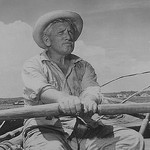Those of you who follow this blog may recall my post about the simplification of some of the classics for children. As I mentioned, Ernest Hemingway’s The Old Man and the Sea, among others was put into “simple” language.
This week, a federal judge ruled that the publisher of these popular kids’ versions are infringing on the copyrights of the famous novelists. The idea was to make literary classics accessible to children as young as six. However, the estates of four literary lions (Hemingway’s The Old Man and the Sea, Kerouac’s On the Road, Truman Capote’s Breakfast at Tiffany’s, and Arthur Clarke’s 2001: A Space Odyssey) joined Simon & Schuster and Penguin Random House in a suit after the publisher of the kiddy books refused earlier demands to stop publishing.
The ruling was clear that this was an infringement on the copyright holders’ rights to exercise control of the publication of their works. KinderGuide Books, the division of Moppet Books that published the child versions of the classic, plans to appeal the ruling by U.S. District Judge Jed Rakoff.

KinderGuide however is continuing to move forward in publishing children’s editions of Jane Austin’s Pride and Prejudice, Homer’s The Odyssey, as well as biographies of Steve Jobs and Oprah Winfrey. The publisher had originally planned to do child versions of 50 classic novels, but given the legal challenges it’s facing, it has already dropped plans to publish illustrated versions of Harper Lee’s To Kill a Mockingbird and J.D. Salinger’s Catcher in the Rye. Catcher in the Rye was published (sort of) by KinderGuides’ co-founder Frederik Colting in 2009 when Colting published an unauthorized sequel to Catcher in the Rye in the United Kingdom entitled 60 Years Later: Coming Through the Rye. In 2011, just before his death, J.D. Salinger obtained a court order blocking the book from ever being published in the U.S.
So for the moment, the simplification, or as some have called it, the “dumbing down” of these classics has been halted.
BELOW MY DECEMBER 2016 POST ABOUT THIS
Four classics so far have been made child friendly by KinderGuides: On The Road, by Jack Kerouac; Breakfast at Tiffany’s, by Truman Capote; Arthur C. Clarke’s 2001: A Space Odyssey—and Ernest Hemingway’s The Old Man and the Sea. The stories have been dramatically abbreviated and have large, colorful illustrations. Among the next four classics to be published by KinderGuides are Harper Lee’s To Kill a Mockingbird, and Jane Austin’s Pride and Prejudice. Bear in mind, these are being read to 6 to 12-year olds. On the Road, by Jack Kerouac, blessedly omits the drugs, prostitutes and wild parties.


Forbes just published an article by Frank Miniter entitled “A Startling Example of How the Politically Correct Currents Pull Strongly Toward Mediocrity.” It starts out asking if Harper Lee’s To Kill a Mockingbird, actually can be watered down for young readers, noting that the great dumbing down of the American mind isn’t just underway, but has become a parody of itself.

The KinderGuides’ version of The Old Man and the Sea begins with, “Santiago is an old fisherman who lives in a small village by the sea, on an island called Cuba. Every day he takes his boat far out into the ocean to catch fish. But after 84 days of trolling, he hasn’t caught any fish at all. He is sad.”
Frank Miniter’s article notes further that The Old Man and the Sea is a concise novella as it is, exploring man’s struggle, not just with a fish, but with his mortality. The prose in the original is hardly difficult. The real Hemingway begins, “He was an old man who fished alone in a skiff in the gulfstream and he had gone eighty-four days now without a fish.” If the word ‘skiff’ is a new and challenging word, there is always the dictionary. At the Forbes article goes on to note, the theme of a man’s struggling, knowing his body is failing him and that inevitably he will be a tragic figure, but that nevertheless he must face his mortality with grace, regardless, is lost in the KinderGuides’ version.
Miniter writes, “Instead of raising children’s knowledge and understanding of these things, this is another example of watering down the education of our youth. Should great paintings also be simplified into cartoon characters? How about plays and music?”


